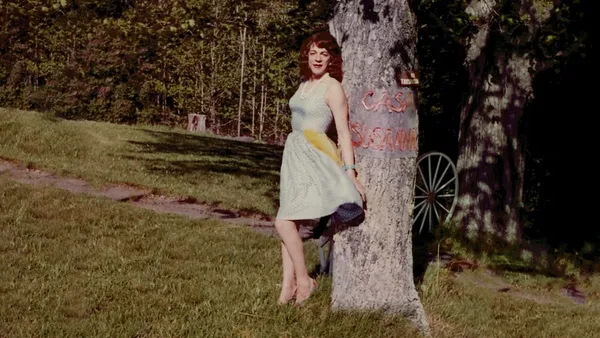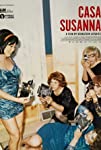Eye For Film >> Movies >> Casa Susanna (2022) Film Review
Casa Susanna
Reviewed by: Jennie Kermode

Times are hard for trans people in the US at present. They have found their private lives and healthcare turned into political wedge issues, and there are scary laws being enacted in some states. In the 1950s, however, simply dressing in clothing deemed to be gender-inappropriate could lead to arrest, and with no public visibility at all, some trans people lived their whole lives thinking they were the only people who felt as they did. When her spouse opened up to her, Maria was determined that things could be better, and together the two of them set up Casa Susanna.
Tucked away in a corner of the Catskills, surrounded by tall trees, there are buildings still standing, buildings which trans women would travel to from all across the US just to get to spend a little time being themselves. They included the pulp science fiction author Donald Wollheim, who is fondly remembered by daughter Betsy, who only learned the family secret on her mother’s deathbed. Over the course of the film she talks about the complexity of her family relationships and how her perspective has changed as a result of that understanding. Joining her here is Maria’s grandson, Gregory Bagarozy, who reflects on his relationship with Susanna/Tito, whom he remembers as if they were two different people.

Both these contributors serve to translate between the language and conceptual framework of the past and that of the present, reflecting that, at the time, people didn’t really know the difference between being trans and being gay, whilst trans women, crossdressers and non-binary people were all lumped into one category, defined by their difference from the accepted norm.
Surprisingly, given the timescales involved, there are still some of the original Casa Susanna attendees around to share their memories. Octogenarian Katherine Cummings travels all the way from Australia to revisit her old haunts and reflect on where life has taken her since. In the process, she reconnects with Diana Merry-Shapiro. Both have had complicated journeys to self-acceptance as women, Diana having had to shake off the prejudices of a strict religious childhood, but they seem utterly comfortable with themselves now, and the contrast is wonderful to see. They laugh as they look back at pictures of themselves in mid-20th Century fashions, each cutting a fine figure, though Casa Susanna, despite a period in which its residents engaged in putting on shows in a local bar, wasn’t really about glamour, and this film is refreshingly free of the usual lipstick application shots. it was simply about being, without pressure. Wives went along too, enjoying a shared understanding and the chance to relax without judgement.
Sébastien Lifshitz’s film is introduced by a snippet from a gameshow of the period. Misty, a bank teller; Vicky, a cosmetician; Sonya, a hairdresser; and Simone, who works on window displays, sit at one side of a small room, elegantly dressed and smiling. “Each of our contestants is a man,” says the presenter, treating it as a shock revelation, but his body language tells us that he doesn’t wholly believe it, and there’s a certain tenderness about the way he engages with them. It’s a reminder that trans people have always existed and found ways of getting by in the world, and that there have always been other people able to see past the prejudices of the time.
A wealth of photographs from Casa Susanna shows women laughing and enjoying very ordinary things. One participant speaks about how amazing it felt to have somebody do her hair for the first time, a simple feminine ritual in which she had never been able to participate. There is talk of borrowed and gifted clothes, of shoes which were flattering and fit, of Maria taking advantage of her guests and getting them to do all the dishes. There is a focus on relationships, then and subsequently, in defiance of popular narratives: trans women who fell in love, raised children, and lived successfully on their own terms. By shining a light on the past, Lifshitz lights a beacon for people who feel outcast in today's world. His film does acknowledge the suffering and the tragedies of the past, but it celebrates the fact that even then, there was more to life.
Reviewed on: 09 Nov 2022
















